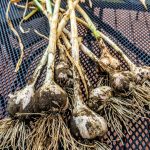Humans are curious by nature; we love to learn. What impacts this desire to understand is the subject matter. However, one truth stays the same, research matters. It is an important aspect of education, careers and day-to-day life.

Garlic Crop 2019
For example, a few years ago I decided I wanted to grow my own garlic. Having never done this before, and being a serial plant killer, I did some research. Turns out garlic is really easy to grow. First you buy garlic and separate the cloves. Then you plant each clove (not bulb) in the ground with the point up, about 4 inches deep and 6 inches apart. You plant in early October and then you leave it until late July. Sometime in the Spring, you will start to see what is called a garlic scape, it is the center stalk of the leaves and it is recognized by the curl. Cut the scape off, if you don’t the plants energy will go towards making a flower rather than growing the garlic bulb. In the summer you harvest, that’s it. I knew nothing about growing garlic, but now because of my research I have a small supply of home grown garlic each year.
Research starts with a question, a quest for an answer that you don’t already know. Good research questions start with an area of interest or an idea. Something that you are personally invested in finding out. As valuable as research is, it can be a struggle, especially for students.
As an educator I find it challenging to get my students to dive deeper in content through research. There is always a resistance to anything beyond surface level. And I get it, from their perspective what is the point? As a student, I frequently take this position. Why would I spend extra time to understand a topic (that I may or may not care about) at a deeper level, when I can know the basics and move on.
My biggest barrier is background knowledge. I find that I frequently get lost in the data and language used in most academic papers. This leads me to skim those sections and look for the main points in abstract and discussion sections. This works if you want surface level understanding but is ineffective when you are trying to develop a position in the field of research. It is also important to have a basic understanding of how research is conducted in structured. I know this because I am currently working on building my understanding. (it’s a slow process). Trying to overcome these barriers as I research is discouraging as I feel as if I am playing ‘catch up’ to my peers.
THIS IS THE WRONG MINDSET TO HAVE!!! Research is an opportunity to broaden understanding of content area and research methodologies. But the key is to start with a question you are interested in. There’s the secret, if you like the subject, or you find it relevant it will be far easier to research.
I would define research as the thorn in my side. A necessary part of being an educator and a student, but an unfortunate discomfort at times. Research is a part of life, at every level, so why not embrace it!
I have had similar experiences with students who want to complete work on a surface level. I agree, it is hard to dive deeper into content, when it is not an interest area. You provided good insight on how your view of research is growing. Just like your garlic, it may take some time and work but you will benefit from it.
When you are not personally invested research can be so hard. I find my best research is done when it is something I really want to do and, more often then not, it is something that I came up with. I hear your struggle with getting students to research and it is real.
Rochelle thank you for your post! The relation to garlic is brilliant. I sympathize with you as I am also a plant killer. Yet, in exploring this idea of growing garlic you touch on some really key points about research. It really is important but it can be SO difficult when you feel like you just don’t care. I completely sympathize with students when they’re expected to research something that truly has no interest for them. I appreciate that you compared research to garlic because it also highlights the fact that sometimes we have to struggle through things to get a result. You rock! Great blog post!